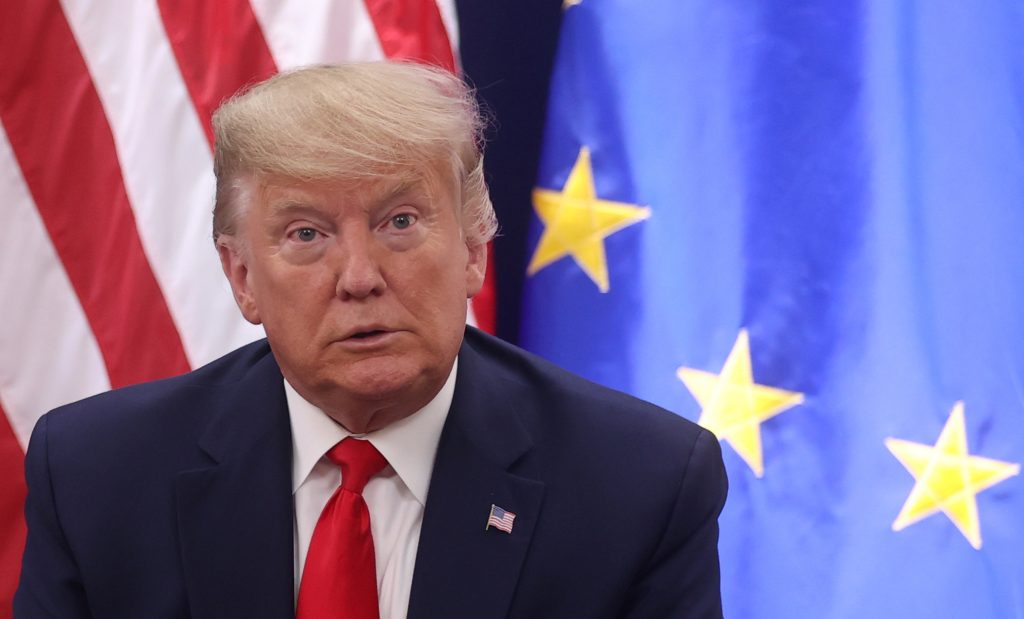00:31

The Republican-controlled U.S. Senate voted early on Wednesday to approve rules governing the impeachment trial of U.S. President Donald Trump, including delaying a debate over whether to call witnesses until the middle of the trial.
With Republicans banding together, the Senate voted 53-47 to adopt the trial plan, which allows opening arguments from House lawmakers prosecuting the case to begin later on Wednesday.
As the third presidential impeachment trial in U.S. history began in earnest, Trump's chief legal defender argued that the Democratic case was a baseless effort to overturn the 2016 election, but a top Democratic lawmaker said there was "overwhelming" evidence of wrongdoing.
The House of Representatives impeached Trump in December on charges of abuse of power and obstruction of Congress for pressuring Ukraine to investigate former Democratic Vice President Joe Biden, a political rival, and impeding the inquiry into the matter. The president denies any wrongdoing.
After U.S. Chief Justice John Roberts convened the proceedings, the two sides began more than 12 hours of squabbling that lasted into Wednesday morning over Senate Majority Leader Mitch McConnell's proposed rules for the trial.
Senators voted along party lines to block four separate motions from Democratic leader Chuck Schumer to subpoena records and documents from the White House, the State Department, the Defense Department and the Office of Management and Budget related to Trump's dealings with Ukraine.
By the same tally, senators also rejected requests for subpoenas seeking the testimony of acting White House Chief of Staff Mick Mulvaney, former national security adviser John Bolton, White House aide Robert Blair and White House budget official Michael Duffey.
Under McConnell's hastily revised set of procedures for the trial, there will be 48 hours of opening arguments – 24 hours for each side – over six days, easing off an earlier plan to keep them to two days each. It also allows the House's record of the probe to be admitted as evidence.
The arguments will begin when the trial resumes at 1 p.m. (1800 GMT) on Wednesday.
Republican senators have not ruled out the possibility of further testimony and evidence at some point after opening arguments and 16 hours of senators' questions, but they held firm with Trump's lawyers to block Tuesday's Democratic requests for witnesses and evidence – a potentially good sign for the White House.

U.S. President Donald Trump during a bilateral meeting with European Commission President Ursula von der Leyen during the 50th World Economic Forum (WEF) annual meeting in Davos, Switzerland, Tuesday. /Reuters Photo
U.S. President Donald Trump during a bilateral meeting with European Commission President Ursula von der Leyen during the 50th World Economic Forum (WEF) annual meeting in Davos, Switzerland, Tuesday. /Reuters Photo
'A total hoax'
White House counsel Pat Cipollone, who is leading Trump's defense, attacked the foundation of the charges against the Republican president and said Democrats had not come close to meeting the U.S. Constitution's standard for impeachment.
"The only conclusion will be that the president has done absolutely nothing wrong," Cipollone said, arguing in favor of McConnell's proposal to wait until later in the trial to decide whether to allow further witnesses or documents.
Democrats accuse Trump of pressuring Ukraine, a vulnerable ally, to interfere in U.S. elections at the expense of American national security and say he is a danger to American democracy.
Trump and his legal team say there was no pressure and that the Democrats' case is based on hearsay.
Shortly before touting his economic achievements while addressing the 2020 World Economic Forum in Davos, Trump called the impeachment a "total hoax."
"It's a witch hunt that's been going on for years and it's frankly, it's disgraceful," the U.S. president told reporters as he headed into the packed conference hall to give his remarks.
Cipollone described the Ukraine investigation as an illegal attempt to remove a democratically elected president and avert his re-election.
"They're not here to steal one election, they're here to steal two elections," Cipollone said.

U.S. Senate Majority Leader Mitch McConnell (R) enters the Senate Floor during U.S. President Donald Trump's Senate impeachment trial in Washington, D.C. on January 21, 2020. /Reuters Photo
U.S. Senate Majority Leader Mitch McConnell (R) enters the Senate Floor during U.S. President Donald Trump's Senate impeachment trial in Washington, D.C. on January 21, 2020. /Reuters Photo
Democratic Representative Adam Schiff, who helped spearhead the House impeachment inquiry, said the president had committed "constitutional misconduct justifying impeachment."
While the evidence against Trump was "already overwhelming," further witness testimony was necessary to show the full scope of the misconduct by the president and those around him, he said.
Republican senators have not ruled out the possibility of further testimony and evidence at some point after opening arguments and senators' questions.
But Democrats said they forced repeated votes on evidence and witnesses, which extended late into the night, to get Republicans on the record immediately.
"This may be our only chance, tonight, to make this a fair trial. And it's just increasingly clear that the White House has no answers for why these documents and these witnesses shouldn't be produced," U.S. Senator Chris Murphy of Connecticut told reporters.
Under McConnell's plan, lawyers for Trump could move early in the proceedings to ask senators to dismiss all charges, according to a senior Republican leadership aide, a motion that would likely fall short of the support needed to succeed.
Even if such a motion fails, Trump is almost certain to be acquitted by the 100-member chamber, where a two-thirds majority is needed to remove him from office.
But the impact of the trial on his re-election bid in November is far from clear.
(With input from Reuters)